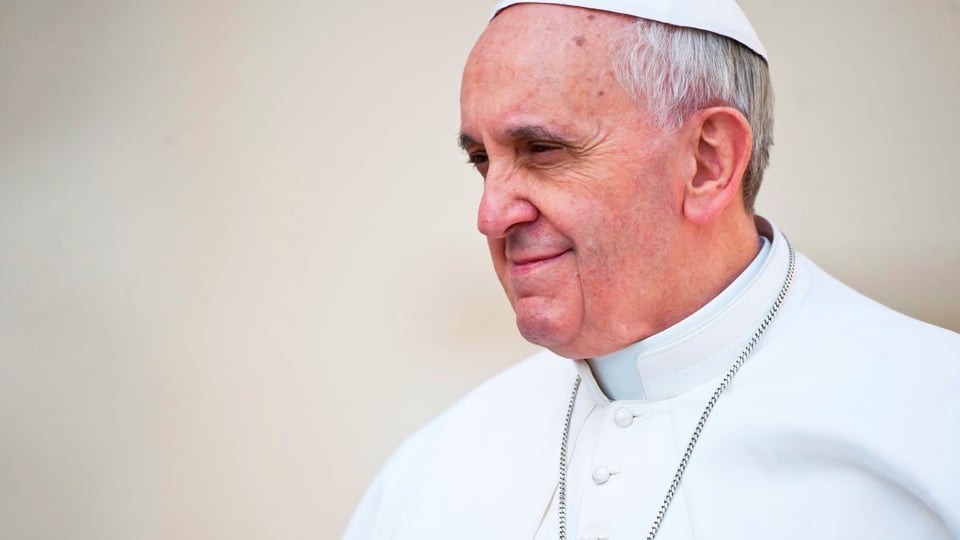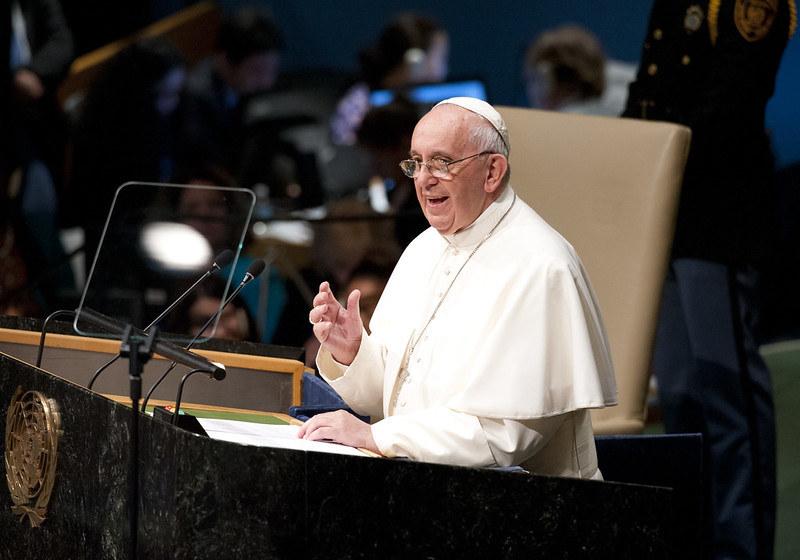What Is the Legacy of Pope Francis?
Pope Francis was elected pope during a time of great controversy in the Roman Catholic Church. This post explores his legacy and the church he led.

Photo by Catholic Church England and Wales via Flickr, CC BY-NC-ND 2.0.
Pope Francis, born Jorge Mario Bergoglio, died on April 21 at age 88. Elected to the papacy on March 13, 2013, he led the Roman Catholic Church through a transformative era.
His papacy followed a turbulent period marked by the sexual abuse scandal, which was a factor in Pope Benedict XVI’s historic resignation in 2013—the first papal abdication since 1415. Francis’ leadership, notable for its many firsts, sought to steer the Roman Catholic Church toward reform amid controversy.
This blog post examines Pope Francis’ legacy through the lens of Bible prophecy.
A pope of firsts
Pope Francis’ papacy was marked by numerous historic firsts, reflecting his unique leadership style and vision for the Roman church.
He was the first Jesuit pope, the first pope from the Western and Southern Hemispheres and the first non-European pope in 1,300 years, since Pope Gregory III of Syria, who died in 741. He also became the first pope to take the name Francis, inspired by St. Francis of Assisi, which he did to demonstrate his commitment to humility, peace and care for the poor.
Breaking with tradition, he resided in the Vatican’s Casa Santa Marta guesthouse rather than the Apostolic Palace.
Pope Francis addresses the United Nations on Sept. 25, 2015. Photo by United Nations via Flickr, CC BY-NC-ND 2.0.
- First pope to address a joint session of the U.S. Congress (September 2015).
- First pope to express support for some kind of blessing on same-sex couples.
- First pope to visit the Arabian Peninsula, traveling to the United Arab Emirates in 2019 to foster interreligious dialogue and sign a document on human fraternity.
- First pope to coauthor a book with interfaith leaders.
- First pope to address the United Nations on environmental concerns, issue an encyclical on the environment and host a Vatican summit on climate change.
Many commentators have noted the most positive aspects of his tenure as fostering peace between faiths, creating an atmosphere of inclusivity and expressing concern for the marginalized and the environment.
But his papacy was also marked by controversies.
A pope of controversy
Many controversies have sullied Pope Francis’ reign from its beginning, as he broke from centuries-old traditions in the Catholic Church.
Consider some of Pope Francis’ comments and actions that have set him apart from previous popes and traditional Catholicism.
- March 2013: He washed and kissed the feet of women, including Muslims.
- July 2013: He said that homosexual acts were sinful, but homosexual orientation was not, stating, “If a person is gay and seeks God and has good will, who am I to judge?”
- September 2013: He assured atheists that it’s not necessary to believe in God to go to heaven.
- October 2014: He seemingly supported evolution over the Genesis creation account when he said that God was not “a magician, with a magic wand able to do everything.”
- September 2017: He signaled support for legal recognition of same-sex civil unions.
- October 2019: During the 2019 Amazon synod, Pope Francis participated in a ceremony honoring indigenous Amazonian traditions and included a statue of the Amazonian goddess Pachamama, sparking backlash from traditionalist Catholics, who interpreted it as an endorsement of paganism.
- July 2021: He restricted the use of the Latin Mass, upsetting many traditionalists.
- December 2023: Pope Francis approved a blessing for same-sex couples.
- September 2024: In Singapore, he attended an interfaith meeting with people of different faiths and said, “All religions are a path to God.”
Many are now discussing how Pope Francis’ legacy will impact the Catholic Church in the coming years and whether or not his successor will build on his legacy or reverse course.
However, the more pressing question is this: How does the church Pope Francis led measure up when tested against the standard of God’s Word—the Bible—the very faith it claims to uphold?
Legacy of the Roman Catholic Church
Despite the genuine sincerity of many Roman Catholics, including those serving in its hierarchy, serious questions arise when its practices and teachings are examined in light of God’s Word.
Why has a church claiming to represent Jesus Christ long upheld teachings that contradict Christ’s very own words? This is not a matter isolated to Pope Francis’ reign, but a pattern that traces back to this church’s origins.
Consider Jesus Christ’s words in contrast to the teachings of the Catholic Church.
Only one Father: Jesus rebuked the Pharisees for assuming and glorying in lofty titles like Rabbi and Teacher. Similarly, the pope bears the title “Holy Father,” and priests are commonly addressed as “Father”—a title that, according to Christ in Matthew 23:7-9, belongs only to our Father in heaven.
To learn more, read “Call No Man Father.”
Traditions vs. commandments: Jesus rebuked the scribes and Pharisees for rejecting God’s commandments to uphold human traditions (Mark 7:9). In a similar way, the Catholic Church distanced itself from the early Christian Church and its original practices for being too “Jewish.” Instead, it adopted customs from the pagan Roman Empire, which contributed to many of the long-standing traditions it continues to observe today, including:
- Changing the biblical Sabbath to Sunday, thus maintaining the Roman tradition of worshipping the sun god on Sunday. (To learn more, read “Who Changed the Day of Worship From Saturday to Sunday? Why?”)
- Rejecting the biblical Passover to celebrate Easter instead. (See our video presentation “How Passover Became Easter.”)
- Adopting the Roman festival of Saturnalia, giving it a Christian veneer by calling it Christmas, while rejecting the biblical feasts of God. (To learn more, read “Four Reasons Christmas Is Not a Christian Holiday.”)
- Altering the 10 Commandments to support its practices. (To learn more, read “10 Commandments List.”)
When a church strays from God’s Word, its fruits contrast sharply with what we expect from a church representing Christ. Jesus prayed His followers would be set apart by God’s truth (John 17:17), and Paul highlighted the importance of Christians receiving “the love of the truth” (2 Thessalonians 2:10). Jesus also said His Church would be known by love, the same love He showed His disciples (John 13:35).
Beware of religious deception
When His disciples asked about signs indicating His second coming, Jesus Christ first warned: “Take heed that no one deceives you. For many will come in My name, saying, ‘I am the Christ,’ and will deceive many” (Matthew 24:4-5).
Jesus issued this caution because He foresaw that many would falsely claim to represent Him, using the name of Christianity, yet misrepresenting His teachings and ultimately deceiving a vast number of people.
To learn more, read “The Destructive Ride of the White Horse of Revelation” and “The End-Time Ride of the White Horse of Revelation.”
A day is coming when all that will change: “The hour is coming, and now is, when the true worshipers will worship the Father in spirit and truth; for the Father is seeking such to worship Him” (John 4:23).
Are you seeking God to worship Him in spirit and truth?
Photo credits:
Photo by Catholic Church England and Wales via Flickr, CC BY-NC-ND 2.0.
Photo by United Nations via Flickr, CC BY-NC-ND 2.0.
Date Posted: April 25, 2025



